Biosecurity Rising Leaders Munich Security Conference Declaration calls for urgent action to embed biosafety and biosecurity into the global life sciences ecosystem. Read about the Munich Security Conference Declaration, and the contributions of iGEMers to it.
Welcome!
This blog is where we share stories, announcements, and insights from around the iGEM community.




















